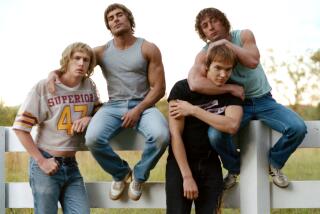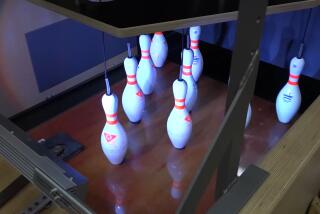Making a Mark : Forkel Finding His Groove as a Professional Bowler
- Share via
Like most aspiring actors, Eric Forkel hopes to land a starring role on one of America’s most popular TV shows.
But he is not an actor; he is a professional bowler.
And although he has come close, Forkel has never made the Saturday matinee. Bowling observers say, however, that Forkel’s moment is nearly at hand.
“Eric seems to be getting better all the time,” said Mike Durbin, a three-time winner of the Firestone Tournament of Champions who is a bowling commentator for ESPN. “He has really solid fundamentals, not a lot of flair out there, but he gets the job done. He has steadily improved as he has bowled on the (Professional Bowlers Assn. national) tour.”
Forkel, a left-handed bowler, did get into the limelight last month when he won the PBA Showboat Western Region Open in Las Vegas. Even though it is not a stop on the national tour, the tournament draws more bowlers than any regional on the West Coast.
“This was a big breakthrough for me,” said Forkel, who lives in Granada Hills. “I bowled for the title and I won with a strong finish. This is a culmination of what I’ve been working on for sometime.”
Still the win--he beat Mark Baker of Huntington Beach, 237-185, in the final--did not come in a national event. Winning one of the PBA’s 33 national competitions is Forkel’s ultimate goal. A victory at one of the national events would qualify him for the tour’s top stop, the Firestone tournament in Akron, Ohio.
Forkel, who will turn 30 this month, has been on the fringe of national success since 1988, when he was named Southern California bowler of the year by the Bowling Writers of Southern California based on his performances in PBA regional events and on the independent Professional Coast Bowlers Tour, which also stages regional events. He has earned $21,000 this year and about $100,000 in the past five years.
Yet nothing has come easily. Forkel constantly battled to maintain a steady income, sometimes from work on the side. In his personal life, Forkel had to overcome the death of his father and the breakup of his marriage.
Getting to the edge of the national pro bowlers circuit was challenge enough, but getting beyond that might be the most difficult part of all.
“The competition is so tough at (the national) level,” Forkel said. “You are going against the best bowlers in the country. You have to try a little harder at this level.”
The Southern California bowler-of-the-year award seemed an obvious springboard for Forkel. Ostensibly, it would bring Forkel offers from sponsors and televised appearances at national events on programs like “Pro Bowlers Tour” on ABC-TV.
Two years later, Forkel is still waiting.
A friend has provided him with additional cash to travel to certain PBA national events, but Forkel has competed in only 26 national events over the past two years. The top bowlers on the national circuit usually compete in that many events in one year.
Consequently, before Forkel’s name becomes commonplace in TV Guide, he feels he must get a sponsor.
In bowling, sponsors differ from those in auto racing and golf in that they generally do not get their names mentioned or shown on television. A sponsor will make a payment covering some of the bowler’s expenses, then take a percentage of the bowler’s earnings.
Despite his failure to gain financial backing, Forkel has been able to maintain his consistency on the lanes. He has continued his winning ways and has progressed into the late stages of some of the top national tournaments.
This summer, Forkel advanced to the semifinals of three PBA national tournaments. He placed 16th in the Fair Lanes Phoenix Classic and in the Columbia Open in Austin, Tex., but his best showing came in the Miller Lite Challenge in Tucson, Ariz. Forkel finished sixth there, just missing the finals of the tournament and a chance to compete in the nationally televised portion of the event.
He is close enough to the big time that he just needs a push to get himself over the edge, but Forkel watchers feel that boost must come from within.
“He has to believe he can win,” Durbin said. “It is now a matter of him believing he can compete with the elite.
“Right now, I am trying to (instill) in him a mental attack,” said Len Mal, Forkel’s coach, who also has coached PBA Hall of Famers Dave Davis, Johnny Petraglia and Dave Soutar. “I have worked on building him a better professional attitude, reminding him that every ball means something and that he must have a winning attitude. The only difference between Eric and guys making $200,000 is mental.”
A six-figure income must have seemed as remote as a 900 series when Forkel became a member of the PBA in 1982. Working as a clerk at an Encino supermarket, he was more concerned with trying to make a living than stardom as a pro bowler.
He had attended Valley College for six months but realized that college was not what what he wanted. Bowling, which he had taken up only five years earlier, would be the ideal way to make a living for Forkel. Unfortunately, it didn’t start that way.
“The first two years, I struggled just to break even,” Forkel said. “I would say I was losing (money) at first.”
While Forkel had to work at the supermarket for financial support, he gained spiritual support from his father Wally. When the two were not arguing about the younger Forkel’s bowling style or his lack of confidence, Eric found in his father constant reinforcement.
“When I first started, I was told by a lot of people that I wouldn’t make it in this sport,” Eric said. “I would receive a lot of negatives, but my father was a positive. We would fight a lot, but he was always trying to help me.”
When Wally died of cancer in 1985, the already insecure Eric needed a new form of encouragement. Eric found some solace in victories, winning a few scratch tournaments that year and showing signs of improvement. But his father’s death slowed Eric’s rise in the bowling ranks.
“He was just starting to get in a positive frame of mind, he was due to start bowling better,” Mal said. “The death of his father really hurt him. His father was his best friend.”
Forkel’s career appeared to be like a bowling ball traveling down the lane, barely clinging to the edge while avoiding a fall into the gutter.
Five years later, he appears to be breaking back into the middle of the lane. Has he begun his break too late, or will Forkel find the sweet spot and begin to win on the national tour?
More to Read
Go beyond the scoreboard
Get the latest on L.A.'s teams in the daily Sports Report newsletter.
You may occasionally receive promotional content from the Los Angeles Times.









